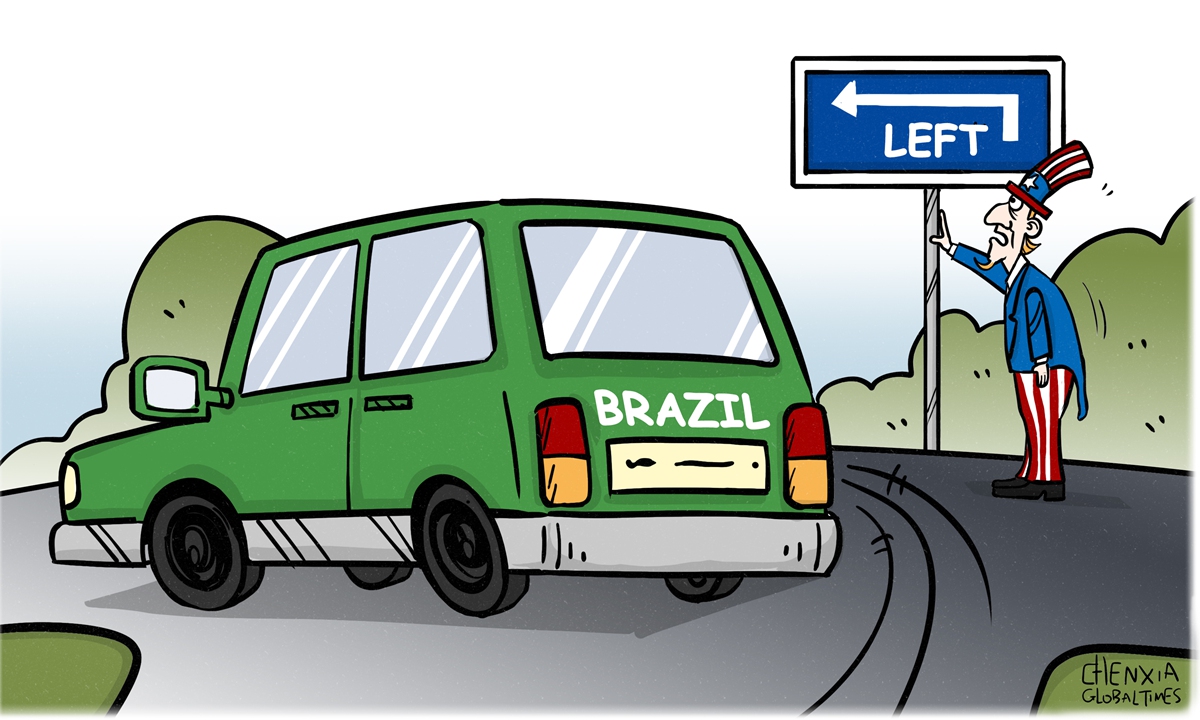
Illustration: Chen Xia/GT
Left-wing former Brazilian president Luiz Inácio Lula da Silva, has narrowly defeated incumbent right-wing President Jair Bolsonaro and won Brazil's presidential election on Sunday. His victory leads a growing left-wing tide in Latin America toward a new peak, marking a fundamental change in the political landscape across the continent.At the end of the 20th century and the beginning of the 21st century, the left-wing forces of more than ten countries in Latin America successively won elections. Some observers refer to the phenomenon as Latin America's collective "left turn" and "pink tide." At that time, Lula was a left leaning moderate. Lula's administration encouraged people to participate in politics, reconciled economic growth with an increase in social spending and public investment in critical sectors of the economy, introduced regulations for the domestic workforce , providing them with social assistance and higher wages, promoted social justice by expanding employment and proactively participated in the formulation of international rules… His government had handed over an answer sheet that satisfies the Brazilian people, who call Lula "the best president Brazil has ever had."
However, since the 2015 Argentine general election, left-wing forces in many Latin American countries have lost in the elections, and the argument of "the end of the Latin American left wing" has been rampant. But only three years later, the left has begun to emerge again, starting with the 2018 elections in Mexico, Venezuela, and Costa Rica, and the elections in Argentina, Bolivia, Peru, Chile, Nicaragua, Colombia and other countries. Up to now, about two-thirds of Latin American countries have elected leftist governments.
In terms of geopolitics, the US views Latin America as its sphere of influence, and its influence on Latin America can be described as ubiquitous. In the 1980s, it used Latin America as a "testing ground" to promote neoliberalism. To be the alternative to neoliberalism was the driving force for the last round of wave of leftism in Latin America. They made significant achievements in promoting the integration process in Latin America and weakening the influence of the US, accumulating experience for resistance to US hegemony. The failure of neoliberalism and the negative consequences remain the fundamental motive for the formation of the current wave of leftism.
The governance deficits caused by the development model that the US has been promoting in Latin America have been magnified by COVID-19 pandemic, leading to people's unprecedented level of dissatisfaction with liberal democratic institutions. In Chile, one of the first countries to initiate reforms with some success, the government considered renegotiating the free trade agreements and sought to join Mercosur as a full member in response to the public outcry.
The domestic crisis in the US and its hegemony over Latin America are the main external forces fueling the left-wing backlash. COVID-19 has exposed the weakness of the American liberal democracy. The inefficiency and disorder of the response to the epidemic exposed the inherent crisis and flaws of the capitalist development model. This has further strengthened the determination of the Latin American to explore the possibility of a non-Western path.
The left-wing wave in Latin America highlights the weakening of US global leadership and the decline of its control over Latin America. The São Paulo Forum and the World Social Forum have provided a platform for the left-wing, anti-neoliberal forces in Latin America and the world. Lula's victory may significantly advance the process of the Latin American left-wing cooperation to explore a new alternative international order.
The author is a researcher at Institute of Party History and Literature of the CPC Central Committee. opinion@globaltimes.com.cn


